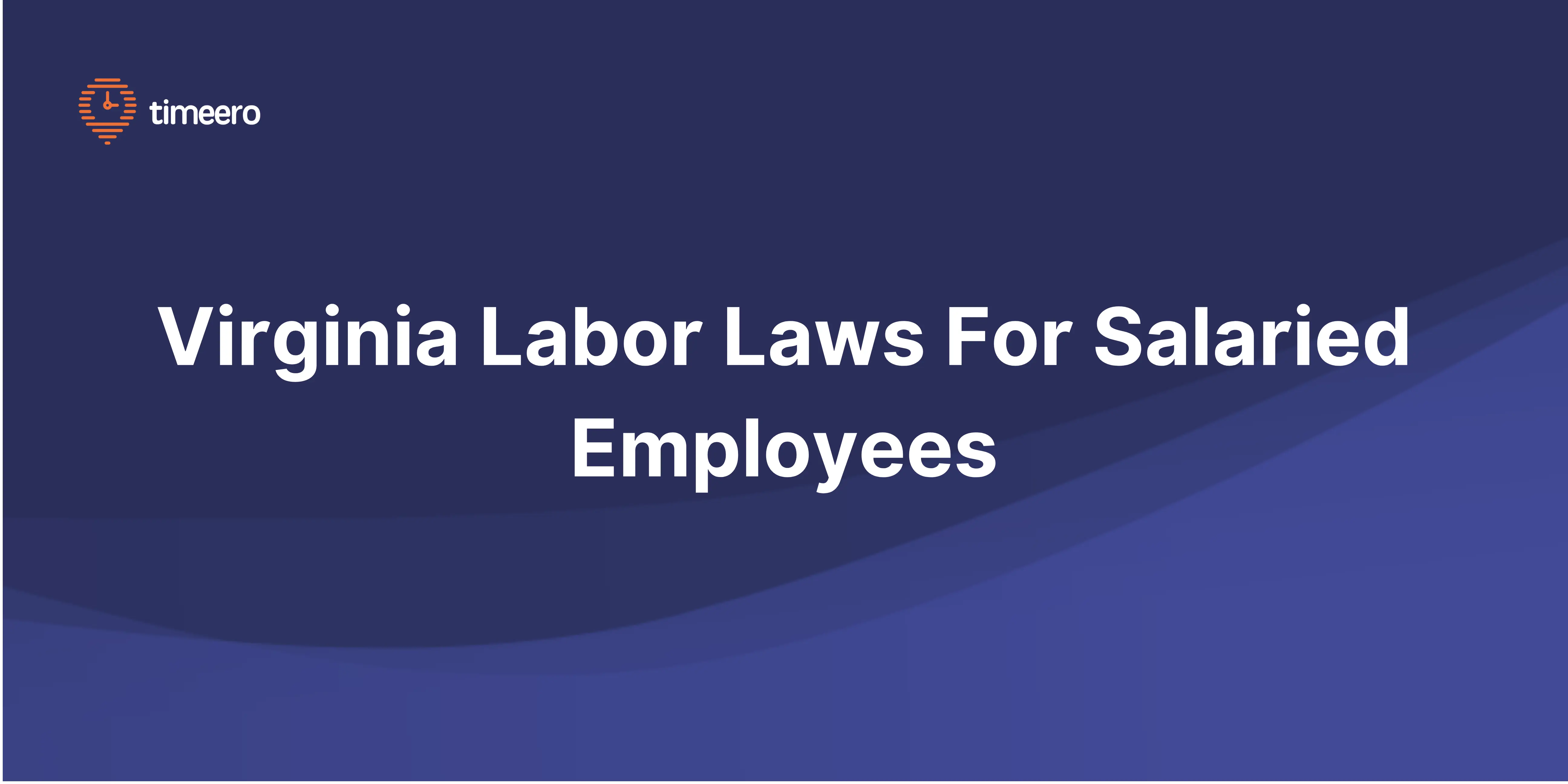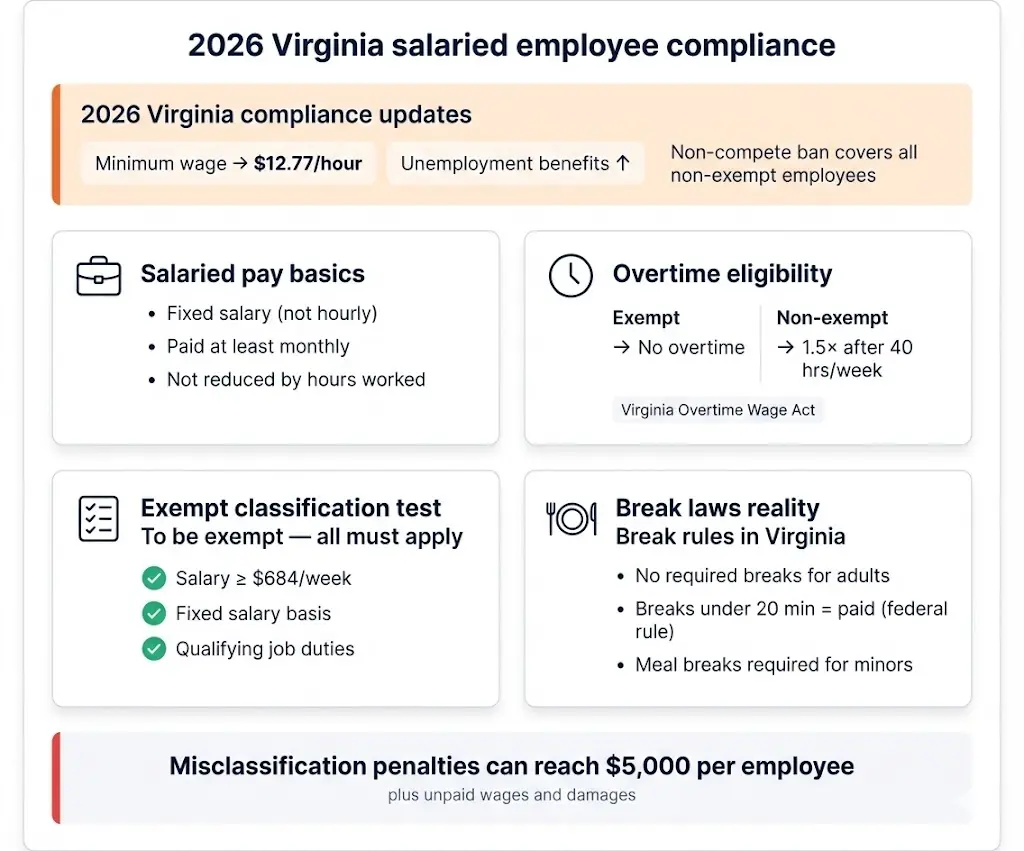Virginia Labor Laws For Salaried Employees in 2026



The Commonwealth of Virginia has crafted friendly labor laws designed to strike a balance between your interests as an employer and employee needs. Virginia’s labor laws are diverse and apply to hourly and salaried employees within the state.
In this guide, we'll focus on Virginia’s labor laws specific to salaried employees. We’ll explore legal requirements that pertain to minimum wage, overtime, breaks, standard hours of work, and leave of absence laws. We'll also discuss how the best GPS time-tracking apps can help you adhere to labor laws in Virginia.
Disclaimer: Our guide should not be substituted for qualified legal advice. Please reach out to an HR specialist or legal advisor for guidance tailored to your specific business needs.
What is salaried employment in Virginia?
Salaried employees in Virginia earn a fixed compensation each pay period, regardless of the number of hours they work. Even if a salaried employee works less than 40 hours per week, they are still entitled to the same amount of pay each month.
Virginia law requires employers to pay salaried employees at least once every month. This means you can adopt a weekly, biweekly, or monthly pay period. Virginia labor laws permit employees to be paid via direct deposits, prepaid debit cards, automated electronic transfers, and checks.
What is the difference between salaried and hourly employees in Virginia?
A notable difference between hourly and salaried employees in Virginia is the compensation structure. As we mentioned, salaried employees receive fixed compensation regardless of the number of hours worked, as well as the quality and quantity of work completed. However, hourly employees are paid at an hourly rate, which means the number of hours an employee works impacts their pay directly.
Additionally, salaried employees aren't subject to Virginia’s minimum wage laws. The minimum salary of salaried employees is determined by the federal Fair Labor Standards Act (FLSA). However, hourly workers are subject to federal or state minimum wage laws.
Note: Virginia’s minimum wage in 2026 is 12.77 hour.
The overtime pay requirements for salaried and hour employees also differ. Salaried employees are only entitled to overtime compensation if they qualify as non-exempt workers. Hourly workers generally qualify for the non-exempt status and are entitled to overtime compensation if they work over 40 hours in a workweek.
There are noticeable differences between the job roles and working conditions of salaried and hourly workers. Salaried employees typically perform administrative, professional, executive, and select sales roles. Hourly workers may be skilled or unskilled, and work in sectors such as retail, manufacturing, hospitality, and administrative support.

What are the differences between exempt and non-exempt salaried employees in Virginia?
The main difference between exempt and non-exempt salaried workers in Virginia is that non-exempt salaried employees are eligible for overtime, while exempt employees are not. Additionally, exempt employees receive a fixed pay regardless of the number of hours they work, while non-exempt employees receive pay based on the amount of hours they work.
Employee classification can have legal and financial implications for your company. Virginia doesn't have its own classification of salaried employees, so it adopts the federal classifications outlined by the FLSA. The FLSA classifications are straightforward, but classifying salaried employees as exempt or non-exempt isn't always easy.
When classifying salaried employees, employers must address three questions:
- Salary level test: To qualify as exempt, an employee's salary must meet or exceed the FLSA's minimum salary threshold, which is currently $684 per week or $35,568 annually.
- Salary basis test: The employee’s pay must be fixed and consistent. Additionally, pay should not be subject to change based on the number of hours worked, nor the quality or quantity of an employee’s work.
- Job duties test: To qualify as exempt, the salaried employee's principal duty must fall within the scope of an executive, professional, administrator, computer professional, or outside sales professional.
Salaried employees who meet these three points of criteria qualify as exempt. When in doubt about a salaried employee's classification, always seek legal advice. Remember, misclassifying an employee in Virginia can result in hefty fines of up to $5,000.
Minimum wage and overtime pay for salaried employees in Virginia
Exempt salaried employees are paid a fixed compensation instead of a minimum wage. These salaried employees are generally excluded from state and federal minimum wage and overtime pay protection.
However, salaried employees who qualify for the non-exempt status are entitled to overtime pay. According to the Virginia Overtime Wage Act (Va. Code § 40.1-29.2), employers in the state must pay overtime at one and a half times the employee's regular rate of pay.
The Virginia Overtime Wage Act (VOWA) differs slightly from the FLSA in calculating the regular rate of pay for non-exempt salaried employees. According to the VOWA, the regular pay rate for non-exempt salaried employees is one-fortieth (0.025) of all wages paid for the workweek, excluding the same items that would be excluded from FLSA calculations. Some of the things you exclude include cash incentive awards, remote worksite allowance, compensatory time earned, travel and per diem payments, and uniform allowance.
Employers in Virginia must pay employees for overtime work. Any overtime wages must be paid in the "legal tender of the United States, checks, or drafts on banks negotiable into cash on demand or upon acceptance at full value."
The VOWA prohibits employers from issuing overtime or compensatory leave in the place of overtime pay except in cases pertaining to fire suppression and law enforcement as defined in subsection A of § 9.1- 701. T. Even if employees agree to waive overtime pay, they can still sue for unpaid wages.
Filing an overtime wage claim In Virginia
Employees can file a lawsuit to recover their unpaid wages and liquidated (double) damages if an employer violates the law and fails to pay for overtime. However, if the employer shows that the violation was made in "good faith," the court may remove or decrease damages.
The new law allows employees to claim overtime pay for workweeks over three years rather than the federal's default two-year limitation. The state also amended the Code of Virginia, which accompanied the new overtime law, to permit employees to file collective actions.
Employees have up to two years to file a lawsuit with the Virginia or the U.S. Department of Labor for unpaid overtime wages. However, if the overtime violation was intentional, employees have up to three years to file the claim.
Hours, breaks, and leave laws for salaried employees in Virginia
Unlike other states in the U.S., Virginia doesn't have a law mandating breaks or rest periods for employees over 16 years of age.
Note: To learn more about break laws in other states, check out our lunch break laws by state guide.
Even though there are no defined break laws, Virginia employers must provide a meal break of at least 30 minutes to minors between 14 and 15 years of age for every five consecutive hours worked. Remember, child labor laws prohibit minors under 14 years of age from working.
While the law doesn't mandate breaks in Virginia, employers can offer meal and rest breaks. If you choose to provide breaks in Virginia, you must do so according to federal break laws, which require paying employees for breaks with a length of 20 minutes or less. However, employers aren't required to pay employees for longer breaks unless they engage in work duties.
Additionally, employers in Virginia must give employed breastfeeding mothers reasonable time to express breast milk in a private non-bathroom location. The breastfeeding break applies up to one year after childbirth. Learn more about situational specifics in our detailed Virginia break laws guide.
How many hours can an exempt salaried employee work in Virginia?
There are no hour laws that govern how many hours an exempt salaried employee in Virginia should work. Remember, exempt salaried employees in Virginia are not paid by the hour. Their pay is consistent and isn't impacted by the number of hours worked, nor the quality or quantity of work.
Employers cannot dock an exempt employee's pay for working less than 40 hours per week. Additionally, exempt salaried employees are not paid for any overtime work.
Leaves of absence in Virginia
Virginia provides mandatory and non-mandatory paid time off (PTO) to its employers. Family and medical leave is required in Virginia, but since there's no state law governing this leave, businesses in Virginia are required to follow the Family and Medical Leave Act (FMLA).
Other types of required leave include:
- Witness leave
- Military leave
- Jury duty leave
- Crime victim leave
Beyond these forms of PTO, employers are not legally required to provide other leaves of absence. However, it's common for employers in Virginia to offer unpaid leave, which may be used in the case of:
- Sickness
- Bereavement
- Vacation
- Voting
Timeero helps your business comply with Virginia labor laws
In 2023, Progressive Services of Virginia LLC, a home health care agency, was found to have violated Virginia overtime laws after a Department of Labor investigation. The agency paid over $604,000 in wages, liquidated damages, and civil money penalties.
This case demonstrates the importance of adhering to Virginia's overtime, break, and labor laws. Some of these laws require the use of reliable technology to remain in strict compliance.
In this section, we'll show you how Timeero – the best time-tracking app — helps Virginia employers adhere to labor laws in the state.
Let's take a look at the features that can help your business:
Accurate time tracking
Tracking salaried employees’ work hours will help you determine when they approach overtime. Timeero makes this task even easier. The time tracking app accurately logs employee hours, including overtime and break time, while avoiding timesheet fraud. Even when internet connection is lost, the app continues to track time without a hitch.

If your business doesn't permit overtime, Timeero helps ensure no employee works beyond the permitted regular work hour threshold. To do this, simply set your salaried non-exempt employees' daily work-hour limit in the app. If any employee exceeds the daily threshold, Timeero alerts you via email, giving you the opportunity to stop the employee from working.
If your company does allow overtime, Timeero helps you to pay employees accurately and fully comply with the Virginia Overtime Wage Act. To implement VOWA laws, navigate to "company settings" and under "payroll and overtime" settings, choose weekly overtime, and set the threshold to 40 hours to match Virginia’s overtime laws.

Timeero tracks employee work hours accurately and divides them into regular and overtime hours. The app also computes the employee's overtime pay based on the predefined regular rate of pay without the manager needing to lift a finger. By taking advantage of Timeero’s automatic overtime calculation capabilities, the need is eliminated for administrators to manually compute overtime pay on payday.
Track with legal compliance in mind
While Virginia laws don't require employers to provide rest and meal breaks, it's a great practice to give your salaried employees a reasonable amount of time to rest. Timeero allows you to add breaks into employees’ schedules that are consistent with business needs and legal obligations.
For example, you can add a 30-minute meal break and assign it to minors in your workforce. Timeero’s break tracking gives employers the flexibility to customize break rules to remain compliant with applicable laws and regulations.

Timeero helps you enforce taking rest and meal breaks in Virginia. The app allows you to configure break rules in accordance with break policies to prevent workers from ending breaks early. You can also allow Timeero to automatically end breaks once an employee has taken a break for the approved length of time. These features encourage employees to take their legally permitted breaks to avoid potential violations.
Additional features of Timeero
In addition to overtime and break tracking, Timeero offers other features that are helpful for businesses in Virginia, including:
- Mileage tracking. If you require field employees to use personal vehicles for business purposes, you must compensate them for any miles driven while on the clock. Timeero’s mileage tracker creates IRS-compliant mileage logs that allow you to reimburse employees quickly and accurately as well as claim any deserved tax write-offs.
- Segmented tracking. This is an indispensable tool for field employees making multi-stop trips. To use Timeero’s Segmented Tracking, employees only need to clock in once at the start of their shift. The feature will begin tracking mileage upon driving and segment an employee’s trip into individual trips based on the stops taken. Each segment on the driving route gives you vital metrics such as total mileage driven and the time spent at each location.
- Shift scheduling. Timeero provides a drag-and-drop scheduler that allows you to create shifts easily. The scheduling tool informs employees of their daily job assignments and holds them accountable for how they spend their time.
- Time off management. Add as many paid and unpaid leave categories as your company policies permit. Timeero makes requesting and approving time off easily accessible. Employees can request time off from their mobile devices and managers can approve or reject leave requests while they are away from office. Learn more about Timeero’s ease of use in our full Timeero review.
Understand Virginia’s labor laws to remain compliant
If you have salaried employees in Virginia, you must comply with relevant labor laws to avoid legal disputes, hefty fines and employee dissatisfaction. If you don’t know where to start when it comes to understanding legal regulations, we recommend consulting a well-versed lawyer to obtain the correct interpretation of each labor law.
You should also implement software solutions to help you enforce labor laws, such as time tracking apps. Timeero is an all-in-one solution that tracks employees’ standard work hours as well as overtime and breaks. Timeero’s time and mileage tracking capabilities keep your business compliant with Virginia’s labor laws.
Start a 14-day free trial today to try out Timeero’s time tracking features. Book a free consultation call to learn how Timeero can be customized to meet your specific business needs.
Virginia labor laws for salaried employees: FAQs
What are the labor laws for salaried employees in Virginia?
Some of the labor laws for salaried employees include overtime, break, and leave of absence laws.
Is overtime pay applicable to salaried employees in Virginia?
Yes, overtime applies to salaried employees in Virginia who qualify for non-exempt status.
What Is the minimum salary requirement for exempt employees in Virginia?
The minimum salary requirement for exempt employees in Virginia is $684 per week or $35,568 per year.





.png)
.png)

.png)




